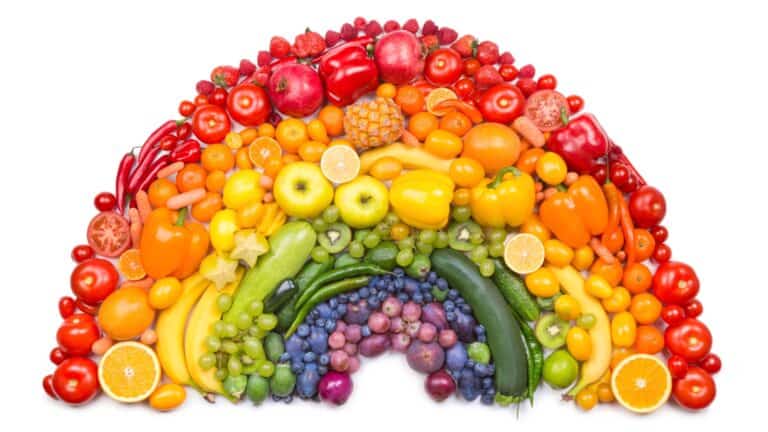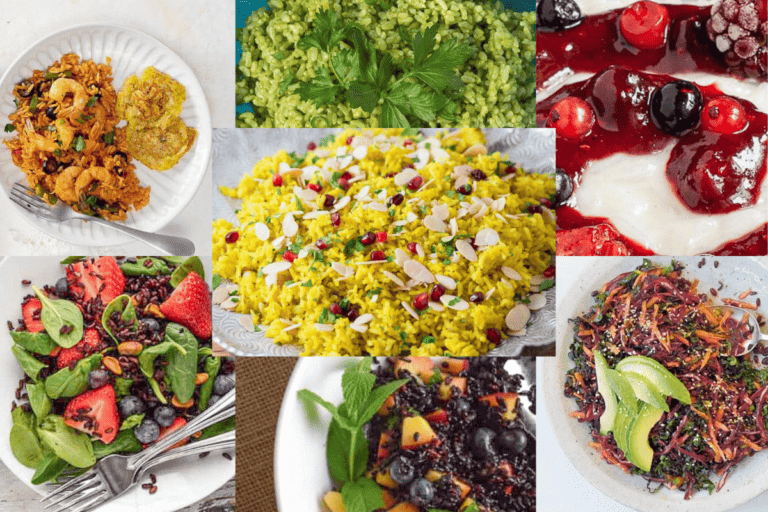Ordering at Starbucks and Dunkin’ Donuts When You Have IBS
Are you tired of feeling bloated, or experiencing digestive upset after your visit to Starbucks or Dunkin’ Donuts? We understand the struggle, and that’s why we’ve created this guide to help you make better choices at your favorite coffee shops. Whether you’re craving a hot coffee, iced frappuccino, or a matcha latte with almond milk, we’ve got you covered. Let’s explore the best options for those with irritable bowel syndrome (IBS), or acid reflux (GERD), or anyone looking to avoid gut issues when enjoying fast food treats.
There’s A Lot of You Out There with IBS – Who Like Coffee!

According to their own research, Starbucks serves 100 million consumers every week in their stores. Meanwhile, between 25 and 45 million people in the US suffer with irritable bowel syndrome (IBS), and two-thirds of those are women, according to AboutIBS.org. So, what if you have IBS and want your Starbucks or Dunkin’? We’ve got the answers.
With any advice that addresses medical issues, we always suggest that you review it with your medical caregivers.
We have also included some non-coffee drinks, such as teas and juices.
What is IBS?

First a quick primer on irritable bowel syndrome (IBS).
IBS is a chronic digestive disorder affecting approximately 10 to 15 percent of the global population. It primarily impacts the large intestine and manifests in various ways, including abdominal pain, diarrhea (referred to as IBS-D), constipation (IBS-C), alternating periods of both (IBS-M), or unclassified IBS-U, where symptoms vary.
The symptoms of IBS arise from abnormal intestinal motility, which can be either too fast, leading to diarrhea, or too slow, resulting in constipation. Coffee, and caffeine, can be a gut irritant for those with – and even for those without – IBS.
Should You Drink Coffee If You Have IBS?
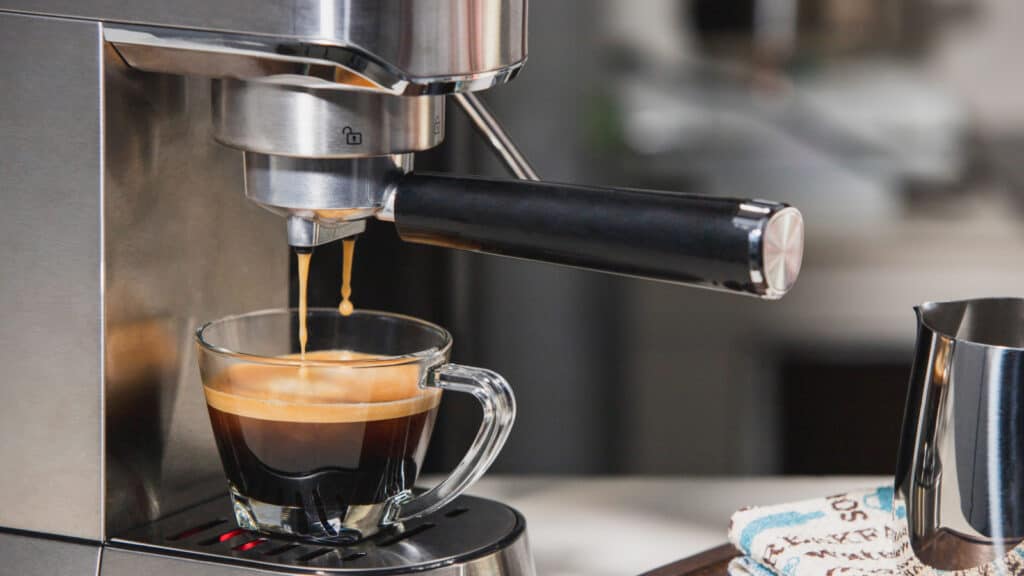
The way IBS manifests will be unique to everyone. Whether you can tolerate coffee or not will depend on your gut. In other words, some folks with IBS tolerate coffee just fine; others don’t. Most of us know whether coffee agrees with us or not, but there are ways to approach your coffee order to at least attempt a great outcome.
By the way, as we mentioned, the caffeine component of coffee can be a gut irritant. Did you know that a shot of espresso contains less caffeine than an 8-ounce cup of brewed coffee? It’s true!
Coffee and Acidity: What You Need to Know

If you’re dealing with acid reflux, or Gastroesophageal Reflux Disease (GERD), the acidity in coffee can be a concern. While it’s a common belief that dark roast coffees are higher in acidity, it’s not that straightforward. The acidity in coffee varies and depends on factors like roast type and coffee bean variety.
Darker roasts have more quinic acid, but it’s not necessarily linked to digestive issues. Di-chlorogenic acid, found in lighter roast coffees, is more often associated with gastric upset. Your digestion is unique, so trust your gut when choosing your coffee roast.
Cold Brew Coffee: A Myth Debunked
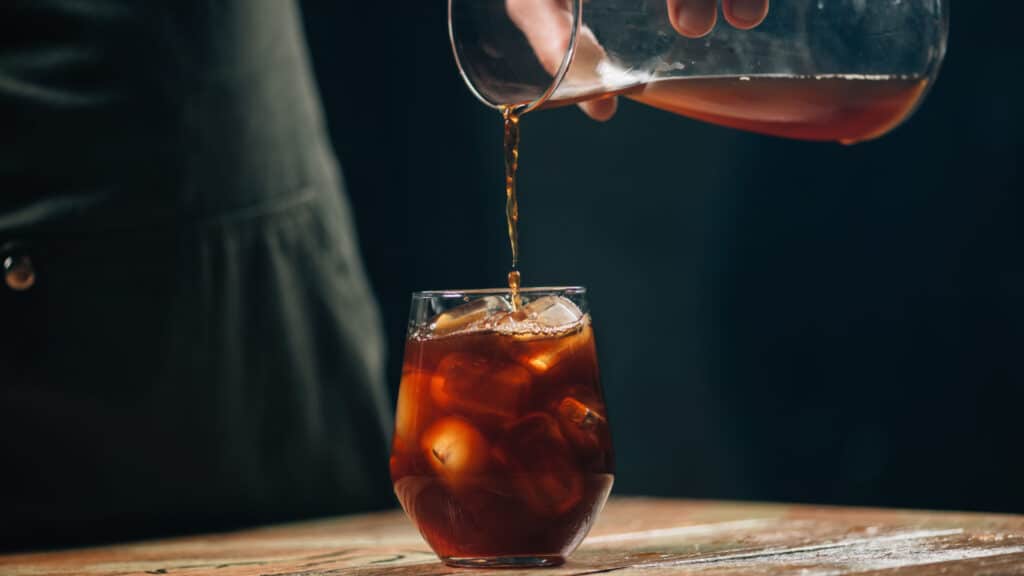
Many people believe that cold brew coffee is less acidic, but research suggests otherwise (and the majority of info online is incorrect). According to 2020 studies and Niny Rao, PhD, a professor of chemistry, the acidity of coffee depends on the roast, not the temperature of the brewing method. Antioxidants are also higher in hot brews. So, feel free to enjoy your favorite coffee, hot or cold, based on your preference.
Let’s Look at Lactose

In addition to caffeine being a potential IBS trigger, lactose (the milk sugar in dairy) can create digestive upset as well. And, given that many of us like milk in our coffee, in the form of a latte, cappuccino, or just to lighten up that black cup of joe, it makes sense to look at milk and alternative milks. Is one better than another for those with IBS?
It is estimated that up to 68% of the world’s population has some degree of lactose intolerance. That said, it can be a matter of amount. Two tablespoons of cow’s milk in a cup of coffee might be fine, but did you know that there is an average of 12-ounces of milk in a Starbucks Grande latte? That’s 1 ½ cups, or 24 tablespoons!
Milk Alternatives
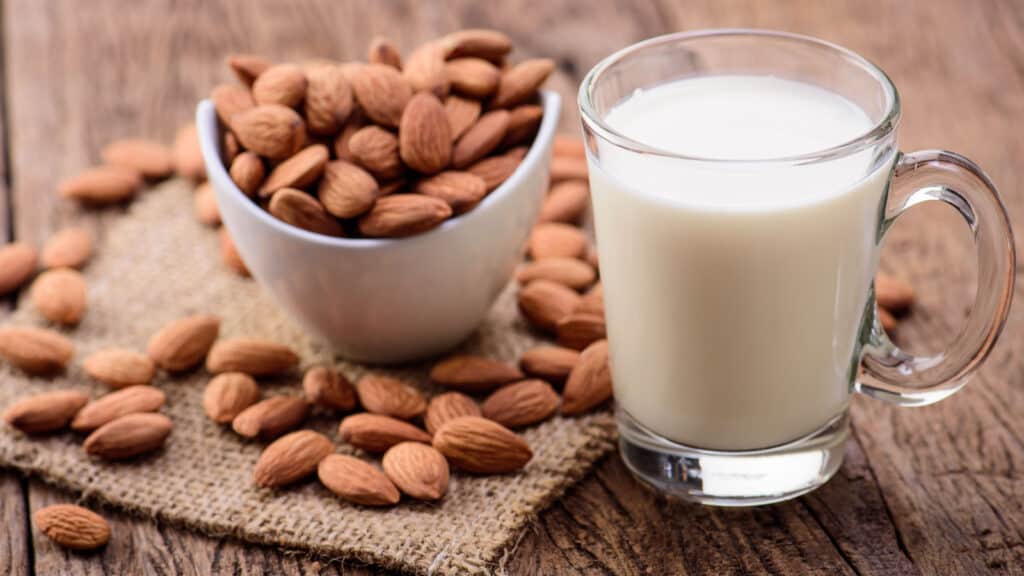
Dairy milk alternatives, often referred to as “alt dairy”, are not necessarily created equal in the way your digestive tract will respond. At Starbucks and Dunkin’ Donuts you can find soy milk, almond milk, oat milk and coconut milk at many locations. You might tolerate some alt milks more than others, and you will be able to determine this with trial an error – but it is worth a try! Ask and see what your local shops offer.
Sugar and Non-Nutritive Sweeteners
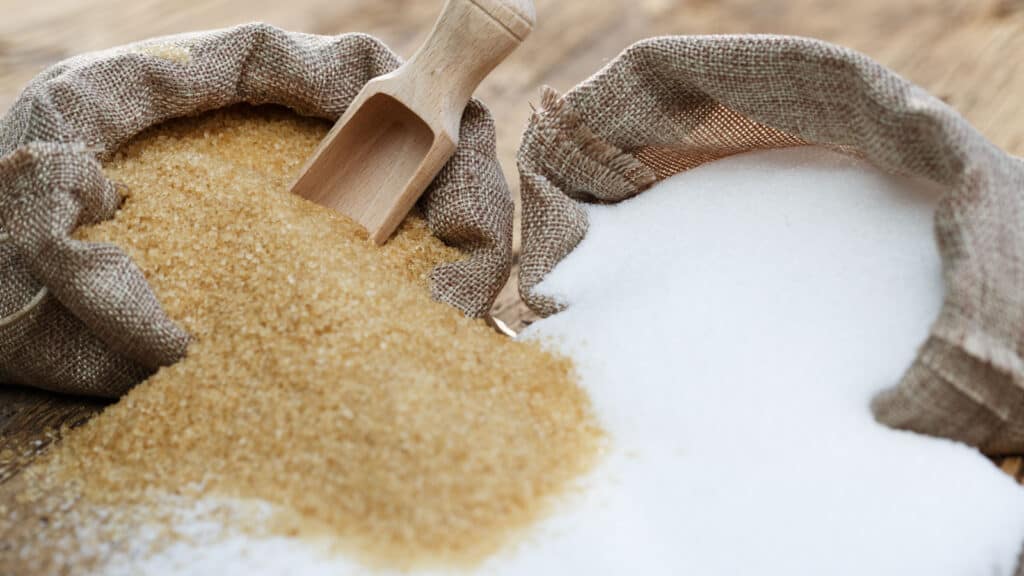
If you like your coffee sweetened, there are choices. There is plain old white sugar, of course, and some coffee shop locations offer raw sugar, too. Then there are the non-nutritive sweeteners (NNS), that many people think are “better” nutritionally. Our dietitians and the World Health Organization do not agree with that assessment.
Short and long term effects of NNS and our gut-microbiome is an area of current study and interest, and there are some indications that NNS could be deleterious to those with digestive issues, and also for those trying to lose weight. Please read the article linked above.
What Are Non-Nutritive Sweeteners?

Here is a list of common non-nutritive sweeteners. Discuss the use of these sweeteners with a dietitian for more information to choose the best coffee sweetener for you.
- Saccharin (Sweet’N Low)
- Aspartame (NutraSweet, Equal)
- Sucralose (Splenda)
- Acesulfame potassium (Ace-K, Sunett)
- Steviol glycosides (Stevia, Truvia)
- Neotame (brand name Neotame)
- Advantame (brand name Advantame)
- Cyclamate (not approved in the U.S., but used in some other countries)
- Allulose (also known as D-psicose)
- Monk fruit extract (also known as luo han guo)
- Thaumatin (Thaumatin-Talyn)
Fat & Sugar Considerations

Coffee shop drinks can be high in fat and sugar, which may be gut irritants for some individuals, on their own and in these drinks, where they are often in combination. Knowing your limits and eating according to your tolerance is essential. Pay attention to serving sizes, especially with fancy coffee drinks, which often come in larger portions – and the sugar and fat content is larger as well.
Serving Sizes at Starbucks and Dunkin’ Donuts
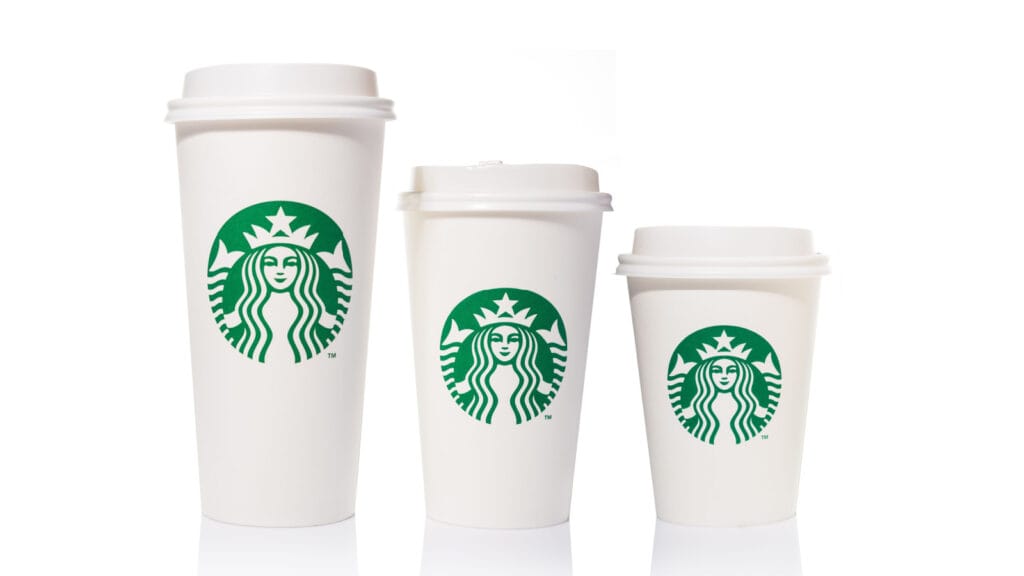
If you have always ordered Vente and Grande sizes at Starbucks, consider scaling down to Grande or Tall. It’s a good rule of thumb to opt for smaller portions to keep caffeine, fat, and sugar intake lower.
Take a look at what the sizes are:
- Starbucks Hot Beverages: Demi = 3 oz, Short = 8 oz, Tall = 12 oz, Grande = 16 oz, Venti = 20 oz
- Starbucks Cold Beverages: Tall = 12 oz, Grande = 16 oz, Venti = 20 oz, Trenta = 30 oz
- Dunkin’ Donuts Hot Beverages: Small = 10 oz, Medium = 14 oz, Large = 20 oz, Extra Large = 24 oz
- Dunkin’ Donuts Cold Beverages: Small = 16 oz, Medium = 24 oz, Large = 32 oz
Starbucks Hot Beverage Suggestions

Here are our hot beverage recommendations for Starbucks orders that might be easier on your digestion:
- Caffè Americano: Black or made with almond milk, coconut milk, or oat milk
- Veranda Blend: Black or made with almond milk, coconut milk, or oat milk
- Dark Roast: Black or made with almond milk, coconut milk, or oat milk
- Pike Place Roast: Black or made with almond milk, coconut milk, or oat milk
- Decaf Pike Place: Black or made with almond milk, coconut milk, or oat milk
- Caffè Misto: Made with almond milk, coconut milk, or oat milk
- Cappuccino: Made with almond milk, coconut milk, or oat milk
- Espresso: Espresso Con Panna
- Flat White: Made with almond milk, coconut milk, or oat milk
- Caffè Latte: Made with almond milk, coconut milk, or oat milk
- Espresso Macchiato: Made with almond milk, coconut milk, or oat milk
- Caffè Mocha: Made with almond milk, coconut milk, or oat milk
- Hot Chocolate: Made with almond milk, coconut milk, or oat milk
- Cinnamon Dolce Crème: Made with almond milk, coconut milk, or oat milk
- Espresso Frappuccino: Made with almond milk, coconut milk, or oat milk
- Caffè Vanilla: Made with almond milk, coconut milk, or oat milk
- Matcha Latté: Made with almond milk, coconut milk, or oat milk
- Royal English Breakfast Tea: plain or made with almond milk, coconut milk or oat milk
- Pumpkin Spice Latte (PSL): order made with almond milk, coconut milk or oat milk, whipped cream, Pumpkin Spice Topping, but no Pumpkin Spice Sauce.
- Peppermint Mocha Latte: order made with almond milk, coconut milk or oat milk, whipped cream, Mocha Sauce, Peppermint Syrup, and chocolate curls.
- Gingerbread Latte: order made with almond milk, coconut milk or oat milk, whipped cream, and Gingerbread Syrup.
Blended Beverages at Starbucks

Some blended drinks could be tried as well:
- Coffee Frappuccino: Made with almond milk, coconut milk or oat milk
- Mocha Frappuccino: Made with almond milk, coconut milk or oat milk
- Matcha Crème Frappuccino: Made with almond milk, coconut milk or oat milk
- Vanilla Bean Crème Frappuccino: Made with almond milk, coconut milk or oat milk
Cold Beverages at Starbucks
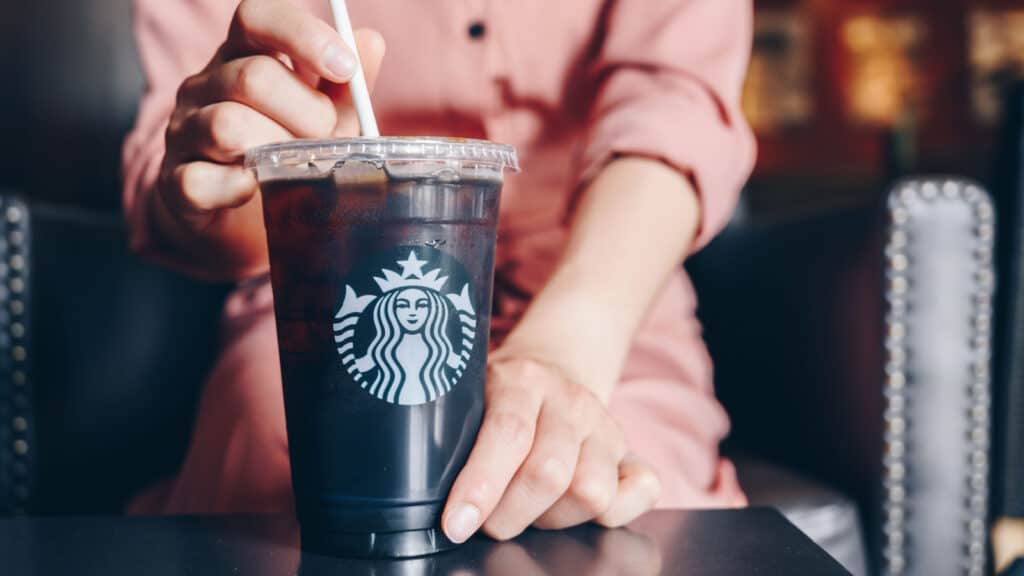
Here are some cold drinks to try:
- Starbucks Reserve Cold Brew
- Starbucks Cold Brew Coffee
- Starbucks Cold Brew Coffee: Made with almond milk, coconut milk or oat milk
- Starbucks Reserve Nitro Cold Brew
- Nitro Cold Brew
- Iced Americano
- Iced Coffee
- Iced Espresso
- Iced Coffee: Made with almond milk, coconut milk or oat milk
- Iced Toasted Vanilla Oatmilk Shaken Espresso
- Iced Brown Sugar Oatmilk Shaken Espresso
- Iced Chocolate Almondmilk Shaken Espresso
- Iced Shaken Espresso: Made with almond milk, coconut milk or oat milk
- Iced Flat White: Made with almond milk, coconut milk or oat milk
- Starbucks Reserve Iced Latte: Made with almond milk, coconut milk or oat milk
- Iced Caffè Latte: Made with almond milk, coconut milk or oat milk
- Iced Cinnamon Dolce Latte: Made with almond milk, coconut milk or oat milk
- Iced Starbucks Blonde Vanilla Latte: Made with almond milk, coconut milk or oat milk
- Iced Caffè Mocha: Made with almond milk, coconut milk or oat milk
- Iced Black Tea
- Iced Black Tea Lemonade
- Iced Royal English Breakfast Tea Latte: Made with almond milk, coconut milk or oat milk
- Iced Matcha Tea Latte: Made with almond milk, coconut milk or oat milk
- Iced Matcha Lemonade
- Evolution Fresh Orange Juice
- Lemonade
- Spindrift Grapefruit Sparkling Water
- Spindrift Raspberry Lime Sparkling Water
- Galvanina Sparkling Water
- Galvanina Sparkling Water – Lime
Dunkin’ Donuts Hot Beverage Suggestions
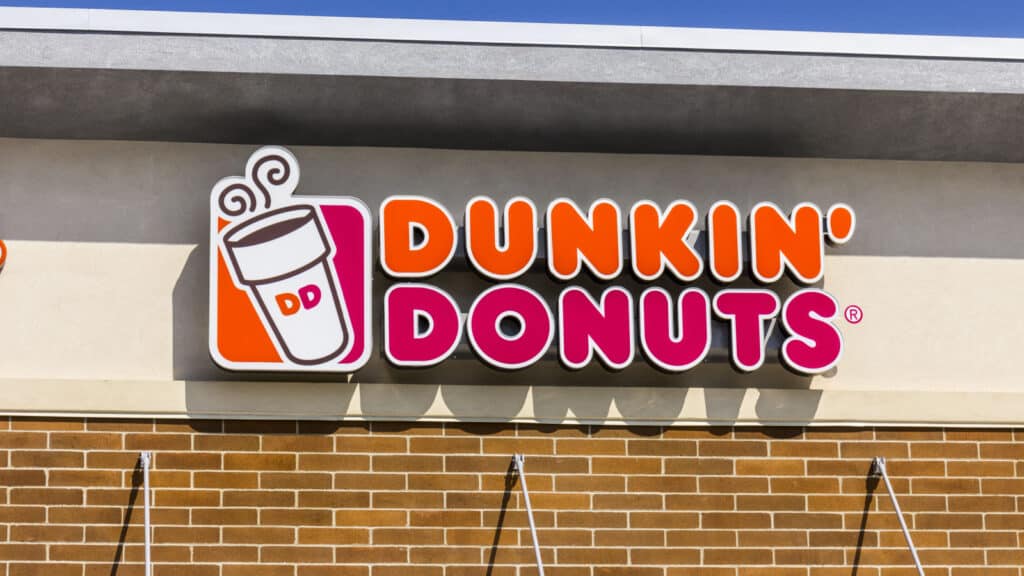
Here are our recommendations for Dunkin’ Donuts hot beverage orders that might be easier on your digestion:
- Coffee: Black or made with almond milk, coconut milk or oat milk
- Espresso
- Americano
- Latte: Made with almond milk, coconut milk or oat milk
- Macchiato: Made with almond milk, coconut milk or oat milk
- Cappuccino: Made with almond milk, coconut milk or oat milk
- Black Tea: Black or made with almond milk, coconut milk or oat milk
- Matcha Latte: Made with almond milk, coconut milk or oat milk
- Chai Latte: Made with almond milk, coconut milk or oat milk
Dunkin’ Donuts Cold Beverage Suggestions
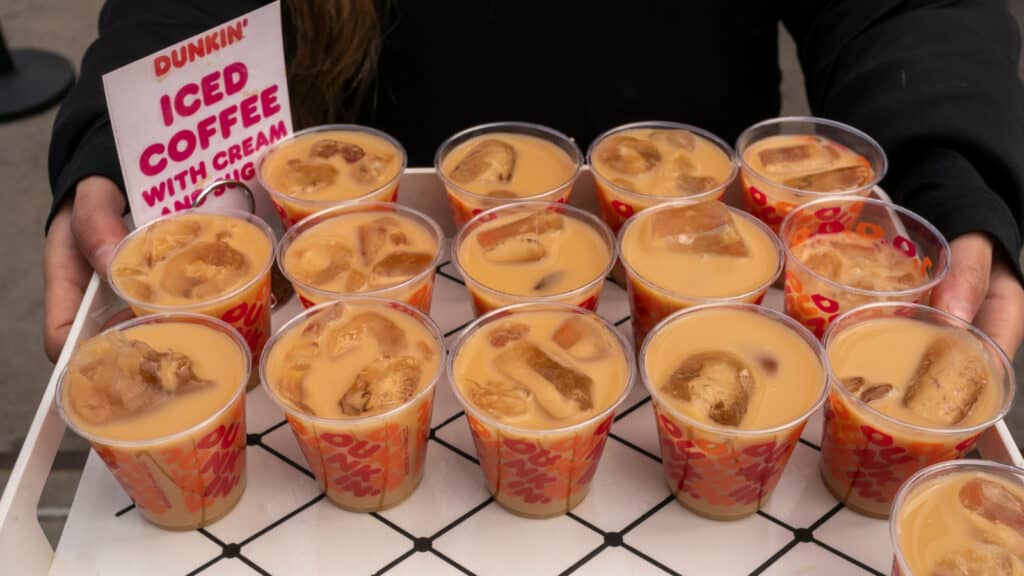
Here are our recommendations for Dunkin’ Donuts cold beverage orders that might be easier on your digestion:
- Iced Coffee: Black or made with almond milk, coconut milk or oat milk
- Cold Brew: Black or made with almond milk, coconut milk or oat milk
- Iced Americano
- Iced Latte: Made with almond milk, coconut milk or oat milk
- Iced Macchiato: Made with almond milk, coconut milk or oat milk
- Iced Cappuccino: Made with almond milk, coconut milk or oat milk
- Iced Tea: Black or made with almond milk, coconut milk or oat milk
- Iced Matcha Latte: Made with almond milk, coconut milk or oat milk
- Iced Chai Latte: Made with almond milk, coconut milk or oat milk
- Frozen Coffee: Made with almond milk, coconut milk or oat milk
- Strawberry Coolatta
- Frozen Matcha Latte: Made with almond milk, coconut milk or oat milk
Now Go And Enjoy! (with moderation)

Whether you plan a daily visit to the local coffee shop, or simply enjoy an occasional visit, you don’t have to avoid Starbucks or Dunkin’ Donuts while dealing with digestive issues. There’s a wide array of options available that could be more easily digested, ranging from hot and cold beverages to blended drinks.
It is essential to keep in mind that even with these recommendation, there are no absolute guarantees that they won’t trigger your IBS symptoms or GERD. Paying close attention to serving sizes is crucial, and generally, smaller portions are the safer choice when it comes to coffee shop drinks.
Furthermore, it’s worth noting that caffeine, found in both coffee and tea beverages, is a stimulant that can potentially irritate the gut. To ensure your comfort and digestive well-being, always consume food and drinks in accordance with your personal tolerances and sensitivities.
More Articles About IBS

Our sister publication FODMAP Everyday is at the forefront of IBS education, particularly in relation to the low FODMAP diet. We have brought versions of many of the articles here for you:
- Understanding the Relationship Between IBS and Diabetes
- How to Breastfeed if You Have IBS
- IBS Treatment: One Size Does Not Fit All
- Understanding IBS Subtypes and Tailored Treatment
- Are You Sabotaging Your Gut Health? 8 Things to Stop Doing Now
Join Us

Join us on this empowering journey as we explore, celebrate, and elevate “her story.” The Queen Zone is not just a platform; it’s a community where women from all walks of life can come together, share their experiences, and inspire one another. Welcome to a space where the female experience takes center stage. Sign up for our newsletter so you don’t miss a thing, Queen!



